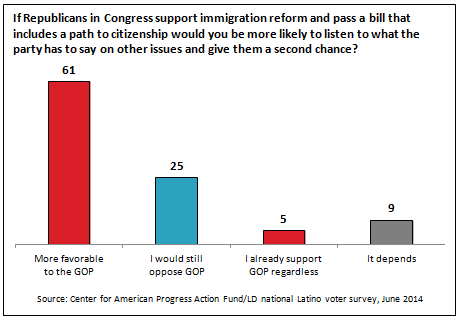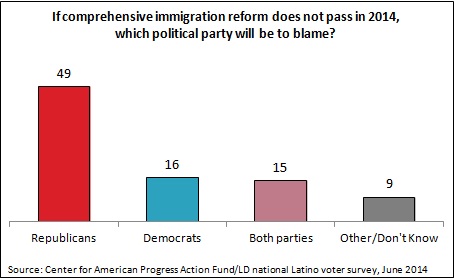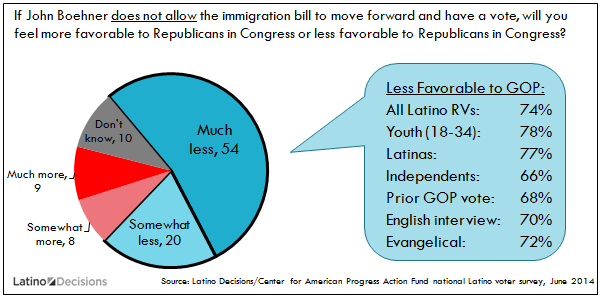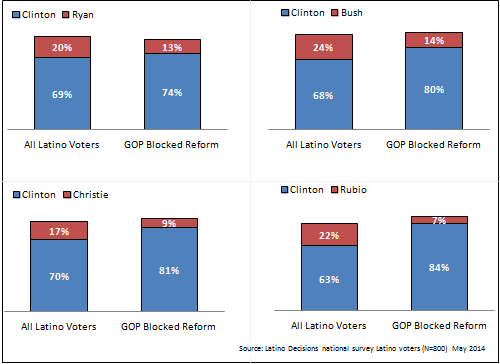President Obama’s comments to the press yesterday provided a strong signal that changes to immigration administration and enforcement via executive actions are imminent. It is important to remember that Congressional failure to pass immigration reform is the sole reason President Obama is now poised to take such actions. In Part 2 of our series “Reviewing the Evidence”, we focus on the political fallout to come from Congress’ failure to pass immigration reform.
Yesterday we highlighted several national polls conducted over the past three years indicating most Americans consistently express their support for a pathway to citizenship. Latino voters remain strongly supportive of President Obama’s 2012 decision on deferred action (DACA), and additional administrative actions could provide a significant boost to the Democratic Party. What does legislative failure followed by executive action portend for the Republican Party? Here is what we know and can expect in the short and long-term.
1. Latino votes ARE available to Republicans. Among registered Latino voters, half tell us they have voted Republican at least once in their political lives. In 2004, George W. Bush got about 40% of the Latino vote. While Republicans would not see immediate brand recovery, stopping the self-destruction of their brand, and positive action on immigration, could have produced significant improvement. The GOP is leaving votes on the table.

2. Latinos will blame Republicans for the failure of reform. There is no question here. Repeated GOP efforts to shift blame to the president should be understood as aimed toward uninformed and moderate white voters. Among Latinos, who is to blame is beyond a doubt. In our most recent poll, nearly half identified the GOP as the culprit for the failure of reform.

3. That blame will have political effects. Latino openness to GOP messaging is going down as a consequence. In June 2014 we asked “If Republican John Boehner, who is in charge of the Congress, does not allow the immigration bill to move forward and have a vote, will you feel more favorable to Republicans in Congress or less favorable to Republicans in Congress?” Since this is, in fact, what came to pass, the answers were really bad news for the GOP’s favorability among Latino registered voters.

4. There WILL be discernible effects on 2014. While it is true that many House seats are insulated from the effects of Latino anger, there are several seats in Arizona, California, Florida and elsewhere where Latino turnout can reshape the outcome, and this is certainly true for statewide races Senate and gubernatorial contests in Colorado, Florida, and Illinois.
5. There will be big effects in 2016. Nobody stands to benefit more from the current politics of immigration than the Democratic nominee does in 2016. While many (though not all) House Republicans can feel insulated—for the time being—from the demographic shifts in the electorate, the national effects (and state-level electoral college effects) will reflect these changes immediately.
In May, Latino Decisions polled on potential match-ups between Secretary Clinton and several potential GOP. The results were astounding. In the climate of recriminations and no progress in the House, former Secretary of State Hillary Clinton led her rivals with shocking margins. Clinton led Senator Marco Rubio 62-21, with about 15% undecided—and that was the closest match-up. She led former Florida Governor Jeb Bush 68-25 with the rest undecided. Clinton led Paul Ryan 69-20, with about 10% undecided. And she led NJ Governor Chris Christie by a whopping 70% to 18%. In every case, among those expressing a preference (netting out the undecided), Hillary Clinton would defeat her rivals by margins larger than President Obama defeated Governor Romney.

This, however, was not the worst of the news for GOP hopes. Among Latinos who blame the GOP for blocking immigration reform, Clinton beats Paul Ryan 74% to 13%, with 13% undecided, Clinton beats Jeb Bush 80% to 14%, Clinton beats Christie 81% to 9%, and Clinton beats Senator Marco Rubio by a surprising 84% to 7%, with 9% undecided. Rubio, whose ethnicity and past support for reform helped him poll best against Clinton among all Latinos, is hurt the most by the House’s refusal to take up immigration reform.
Any of these margins, when adjusted for undecided voters, would yield historic Democratic margins among Latino voters in 2016.
Gary Segura is co-founder and principal of Latino Decisions. He is a Professor of American Politics at Stanford University, where he is also Chair of Chicana/o Studies. His latest book,Latino America: How America’s Most Dynamic Population is Poised to Transform the Politics of the Nation, draws from years of Latino Decisions research and is set for publication next month.

